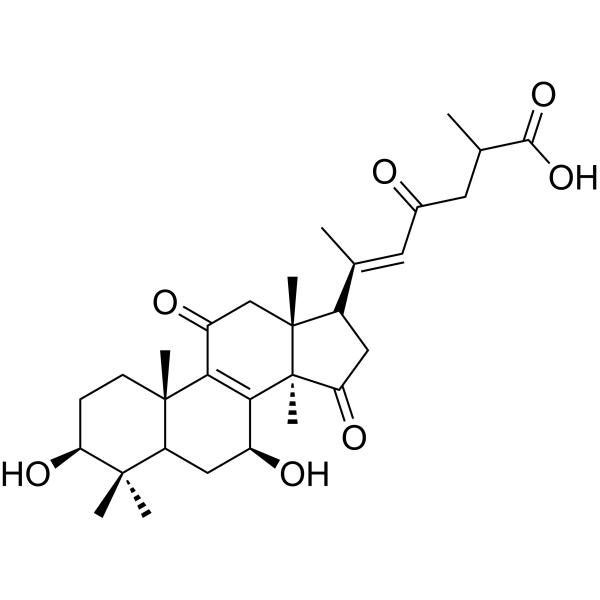
Ganoderenic acid B
CAS No. 100665-41-6
Ganoderenic acid B( —— )
Catalog No. M31664 CAS No. 100665-41-6
Ganoderenic acid B, a natural product derived from Ganoderma lucidum, can work by inhibiting the transport function of ABCB1 and enhancing the cytotoxicity of chemotherapy drugs against AbCB1-mediated multidrug resistant cancer cells.
Purity : >98% (HPLC)
 COA
COA
 Datasheet
Datasheet
 HNMR
HNMR
 HPLC
HPLC
 MSDS
MSDS
 Handing Instructions
Handing Instructions
| Size | Price / USD | Stock | Quantity |
| 5MG | 356 | In Stock |


|
| 10MG | 534 | In Stock |


|
| 50MG | Get Quote | In Stock |


|
| 100MG | Get Quote | In Stock |


|
Biological Information
-
Product NameGanoderenic acid B
-
NoteResearch use only, not for human use.
-
Brief DescriptionGanoderenic acid B, a natural product derived from Ganoderma lucidum, can work by inhibiting the transport function of ABCB1 and enhancing the cytotoxicity of chemotherapy drugs against AbCB1-mediated multidrug resistant cancer cells.
-
DescriptionGanoderenic acid B, a natural product derived from Ganoderma lucidum, can work by inhibiting the transport function of ABCB1 and enhancing the cytotoxicity of chemotherapy drugs against AbCB1-mediated multidrug resistant cancer cells.
-
In Vitro——
-
In Vivo——
-
Synonyms——
-
PathwayOthers
-
TargetOther Targets
-
Recptor——
-
Research Area——
-
Indication——
Chemical Information
-
CAS Number100665-41-6
-
Formula Weight514.65
-
Molecular FormulaC30H42O7
-
Purity>98% (HPLC)
-
SolubilityIn Vitro:?DMSO : 100 mg/mL (194.31 mM)
-
SMILES——
-
Chemical Name——
Shipping & Storage Information
-
Storage(-20℃)
-
ShippingWith Ice Pack
-
Stability≥ 2 years
Reference
molnova catalog



related products
-
Mupadolimab
Mupadolimab (CPI-006) is a humanized FC-γR binding deficient IgG1 anti-CD73 antibody with potential anticancer activity and activation of CD73POS B cells.
-
Nomilinic acid
Nomilinic acid is a useful organic compound for research related to life sciences.
-
NADH disodium salt h...
NADH is the reduced form of nicotinamide adenine dinucleotide (NAD) that can donate electrons as part of a reducing reaction. In that process NADH becomes oxidized to produce NAD+. A variety of enzymes use NADH plus H+ to reduce substrates generating NAD+ as well as the reduced product.



 Cart
Cart
 sales@molnova.com
sales@molnova.com


